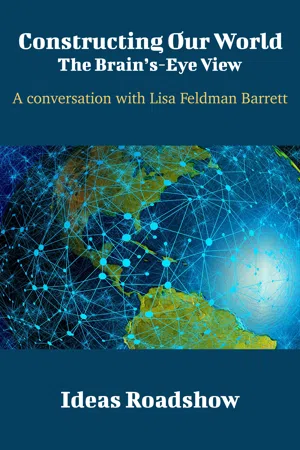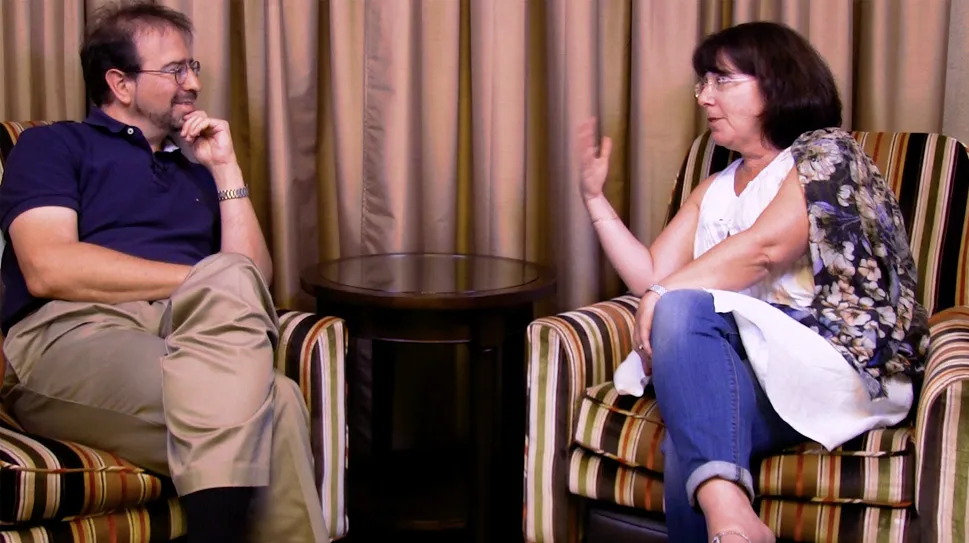![]()
The Conversation
![]()
I. Beginnings
A winding road
HB: I thought we’d talk about your beginnings and your interest in what was, I’m supposing, then psychology—not so much cognitive science—what peaked your interest there and how you got going.
LFB: Well, when I was in high school, I was primarily focused on the sciences and I took some history, but we didn’t have psychology in high schools at that time.
HB: This was in Toronto, right?
LFB: Yes, this was in Toronto. So when I went to do my undergraduate degree at the University of Toronto, I thought I was going to be a physician. I thought I was going to medical school, so I took all the pre-med courses, and then I had one more course I had to pick up, so I decided to take a psychology course.
I really took the course because the professor—whose name now escapes me—was really wonderful at teaching and he used to hold his lectures in this place called Convocation Hall, which is a huge lecture theatre, so he would have a thousand students that he would lecture to. My friends loved this course and loved him as a lecturer, so I thought I would just take it and see what I thought.
He was a fabulous lecturer; you felt like he was talking to you specifically, even though you were in this cavernous space. But I really liked the material too. I was just really captivated, by all of it, actually.
HB: What was it, specifically, about that whole experience that captivated you? Do you remember? Was it more him personally or the material?
LFB: He certainly was engaging and he made it very personal. Whereas introductory psychology textbooks are very well known for containing a lot of details that you memorize and not much in the way of connecting those details to everyday life, he was really good at doing that.
And I guess I’ve just always wondered about people’s motivations. I’ve always had a sense for as long as I can remember that different people can see the same event in very different ways, and here was a course where I was actually given some formal tools to think about these issues in a little bit more precise way.
So I really loved it, and I actually decided to switch my major from biology to psychology. I had to make a decision as to whether or not I was going to major in psychology or anthropology, because I was also taking anthropology courses, which I also loved. In particular, I was really interested in human evolution, so I sort of suffered through cultural anthropology classes, even though now I very much enjoy that perspective too.
I was really fascinated by physical anthropology, so I just took a lot of classes in physiology—both in anthropology and in biology—and I took a lot of psychology classes and some linguistics classes—I think I was one course short of a minor in linguistics.
HB: So you were, in fact, really delving into what is now cognitive science, before its time, as it were.
LFB: Yes, I had no idea. Most of these courses I had never had any access to as a high school student, and I loved my undergraduate experience. I just loved going to classes. I was working two jobs at the same time to pay for it. I had a small scholarship, but I don’t come from an affluent background. I had to put myself through school, so I was working two jobs and taking these classes. Even though it was hectic, it was really fun.
HB: Did many other of your fellow psychology students share your perspective on things? I ask because a common stereotype in my experience is, Most people who take psychology as undergrads are strongly motivated to do so in order to deal with their own issues.
I’m not necessarily implying that that’s true, I’m just saying that that’s the stereotype in my experience. What are your thoughts about that? Did you find yourself surrounded by those sorts of people? Is there any merit to that generalization, because you clearly didn’t come at it from that sort of perspective at all?
LFB: I guess I would say a couple of things about that. One is, I used to think that psychology—clinical psychology in particular, since that’s what I did my PhD in originally—was filled with people who were really nuts—to use a very precise scientific term—and that they were just trying to figure out themselves, “me-search”, as some people call it.
But I’ve discovered that, actually, in academia in general—or maybe just scientists in general—there’s just a large proportion of really odd people who think about things in a really odd way, and that’s why they are good scientists: because you have to be able to see things other people don’t see, you have to notice phenomena other people don’t notice, you have to be able to look at things in an unconventional way. I think the proportion is actually high in all the sciences.
I would say—even in biology, and chemistry, and physics—the people I know who went into those fields were doing it very much for personal reasons, they’re trying to understand themselves and their place in the universe and that’s what takes them into cosmology, say. I still think the proportion is actually really high for all of the scientific disciplines. It’s not specific to psychology.
HB: It’s just easier to pinpoint with psychology because of the nature of the field.
LFB: Yes, I think so. That’s my sense. We’re all a little bit nuts, maybe, and that’s what maybe helps us be scientists.
HB: OK, so you’re captivated by this, you finish your undergraduate degree, and then you think, I’m going to do a PhD in this sort of thing. Is that right? Or is that not how it happened?
LFB: It didn’t really quite happen like that. I was really on the fence about medicine or a PhD in psychology, and I really couldn’t decide up until the last minute. In my fourth year, I applied to only two graduate schools, because I still wasn’t sure where I was going to go to graduate school.
I was engaged to be married—my high school sweetheart, actually—and his entire family were all physicians. And everybody I knew, all of my friends, were all going to medical school, or law school, or dentistry—all these professional programs. So I really wasn’t sure what I was going to do and there was some pressure to go to medical school.
HB: It seems like there might have been a lot of pressure.
LFB: There was a lot of pressure to go to medical school, but I actually loved doing research. And at that point, I had been working in a lab for a couple of years—I worked in a developmental lab and a social psychology lab—so I applied to do a PhD in clinical psychology at the University of Waterloo, which was the best program in the country at the time. It was very well respected in North America. It was seen as quite a terrific program.
Then I applied to do a PhD with Dan Schacter, in cognitive psychology. He was at the University of Toronto and was one of my professors when I was an undergraduate. So I applied to do a degree with him, and I was accepted to both programs. Then Dan decided to take a job at the University of Arizona and I wasn’t really in a position where I could go with him, so I decided to do the degree in clinical psychology.
HB: Did that meet your expectations immediately? Did it take a little bit of settling in? How did that work?
LFB: It took a tremendous amount of settling in. In retrospect, I’m glad that I have a clinical degree, but it was not a good fit for me from the beginning, because—well, this is a whole other story, but in clinical psychology, at the time, there was a lot of debate about what the ...

